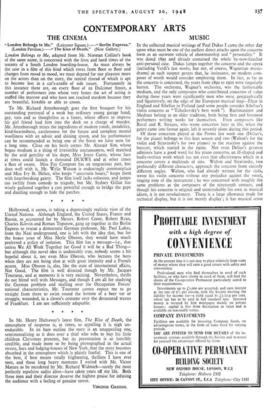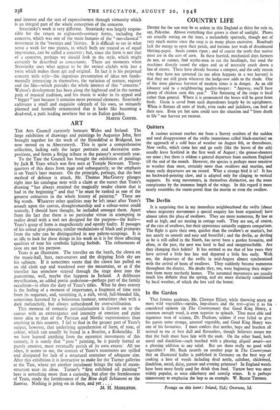IN the collected musical writings of Paul Dukas I came
the other day upon what must be one of the earliest direct attacks upon the concerto form as an outworn vehicle of showmanship and "personality." It was dated 1895 and already contained the whole by-now-familiar anti-personal case. Dukas lumps together the concerto and the opera (including Verdi's last works, but not, of course, Wagnerian music- drama) as such suspect genres that, he insinuates, no modern com- poser of worth would consider employing them. In fact, as far as the concerto is concerned, the years from 1890 to 1920 were singularly barren. The orchestra, Wagner's orchestra, was the fashionable medium and the only composers who contributed concertos of value during those years were significantly men who were, geographically and figuratively, on the edge of the European musical map—Elgar in England and Sibelius in Finland (and some people consider Sibelius's violin concerto as " Tchaikovsky's best work "). Rachmaninov and Medtner belong to an older tradition, both being first and foremost performers writing works for themselves. Even composers like Ravel and R. Strauss, who wrote concertos later in life, when the genre came into favour again, left it severely alone during this period.
Of three concertos played at the Proms last week one (Delius's, for the piano) belongs to this lean season and two (Walton's for the violin and Stravinsky's for two pianos) to the reaction against the boycott, which started in the 1920S. Not even Delius's greatest admirers have a good word for his piano concerto, an ill-shaped and badly-written work which has not even that effectiveness which in a concerto covers a multitude of sins. Walton and Stravinsky, two profoundly different characters, approach the concerto from entirely different angles. Walton, who had already written for the viola, wrote his violin concerto without any prejudice against the sweet, singing tone of the instrument ; he was concerned with roughly the same problems as the composers of the nineteenth century, and though his concerto is original and unmistakably his own in musical idiom, it is not revolutionary. There is a large allowance made for technical display, but it is not merely display ; it has musical sense
and interest and the sort of expressiveness through virtuosity which is an integral part of the whole conception of the concerto.
Stravinsky's work is very different. Stravinsky was largely respon- sible for the return to eighteenth-century forms, including the concerto, which was one of the main features of the " neo-classical " movement in the 'twenties and 'thirties. It is difficult to see in what sense a work for two pianos, in which both are treated as of equal importance, can be called a concerto ; but, since the form is not that of a concerto, perhaps we should look to the style, which might certainly be described as concertante. There are moments when Stravinsky uses what appear to be the veriest clichés with just a twist which makes them apt and original. In fact it is his perpetual concern with style—the ingenious presentation of ideas not funda- mentally interesting in themselves, the variation of texture, register and the like—which provides the whole interest of this "concerto." Walton's development has been along the highroad and in the normal path of musical tradition, and his music is wider in its appeal and " bigger " just because it contains more personal elements. Stravinsky cultivates a small and exquisite sidepath of his own, so minutely planned and formally ornamented that it looks like becoming a dead-end, a path leading nowhere but to an Italian garden.
MARTIN COOPER.



































 Previous page
Previous page